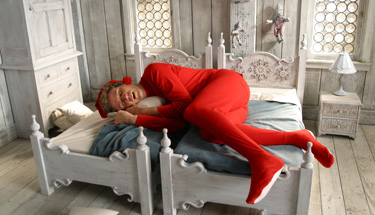|
|
A-List: Comfort FilmsBy Josh SpiegelSeptember 10, 2009
Set up as, in some ways, the telling of a comfort story, the verbal version of chicken soup, The Princess Bride has something for everyone. For every man, there is a swordfight to end all swordfights. For every woman, there is a time-spanning romance filled with tragedy. There is comedy, there is drama, there is villainy, and there is even time for a minister with a voice like Elmer Fudd. It's perhaps the best film from director Rob Reiner; it's the highlight of Cary Elwes' career, and it may also be the only movie where Billy Crystal, Robin Wright Penn, and Peter Falk all appear, as randomly as it sounds. For all the times you feel like the young Fred Savage, hearing this story unfold, you will also fall for it and feel infinitely better. Willy Wonka and the Chocolate Factory The songs are not particularly great (what, you don't sing "Cheer Up, Charlie" in the shower every morning?), the set is pretty obviously fake (Gene Wilder was chomping on wax when he chewed up that little yellow teacup at the end of "Pure Imagination"), and some of the child actors are...well, kind of bad. And yet, the 1971 version of Roald Dahl's novel, Willy Wonka and the Chocolate Factory is a great movie to watch endlessly. Part of the joy comes out of Wilder's tour-de-force performance, part of it comes from anticipating when exactly Wilder will show up (he's absent from nearly 40 minutes of the film, and boy, does it ache when he's not onscreen), and part of it comes from the sly, edgy humor. Why do we see various people dealing with not having golden tickets and going to such lengths as abduction and computer fraud to get it? The quirks and intricacies are what make this movie unique; Wilder, the innumerable Oompa-Loompas, and all that damn chocolate are what make it great.
|

|
|
|

|
Wednesday, May 8, 2024
© 2024 Box Office Prophets, a division of One Of Us, Inc.


